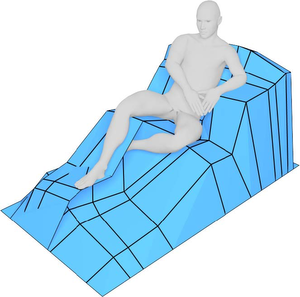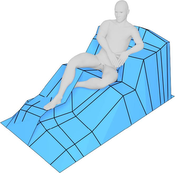Information
- Publication Type: Master Thesis
- Workgroup(s)/Project(s):
- Date: October 2019
- Date (Start): November 2018
- Date (End): 21. October 2019
- TU Wien Library:
- Diploma Examination: 22. January 2020
- First Supervisor:
- Keywords: optimization, fabrication
Abstract
Modern furniture design systems provide seating solutions for various applications, ranging from general purpose solutions to specific environments. The central goal of furniture design is to create comfortable seating surfaces. To provide optimal comfort for a specific person and environment, personalized furniture design is required. As comfort is generally seen as the user’s subjective feeling, objective comfort measures are defined that approximate a person’s comfort for a given seating surface. Computational furniture design systems create seating solutions for a given scenario using interactive algorithms. Specialized seating surfaces often require extensive manual design effort. In this thesis, a computational furniture design framework to generate personalized seating surfaces is proposed. Utilizing a notation of sitting comfort based on equal pressure distribution, our algorithm generates seating surface models fitted to a person in a specific pose. We introduce an automated furniture design framework able to create comfortable seating surfaces for specific body shapes and poses. We developed a generic template model capable of supporting a large variety of sitting poses and human body shapes that is matched to an input pose in multi stage fitting process. Furthermore, we introduce a non-linear mesh optimization algorithm for further functional and visual improvements. In addition, the proposed framework serves as a fully automated solution to create specialized control meshes usable as input meshes in other design frameworks, thus eliminating the need for manual design effort.Additional Files and Images
Weblinks
No further information available.BibTeX
@mastersthesis{WINKLER-2019-PDG,
title = "Pose-Driven Generation and Optimization of Seating Furniture",
author = "Andreas Winkler",
year = "2019",
abstract = "Modern furniture design systems provide seating solutions
for various applications, ranging from general purpose
solutions to specific environments. The central goal of
furniture design is to create comfortable seating surfaces.
To provide optimal comfort for a specific person and
environment, personalized furniture design is required. As
comfort is generally seen as the user’s subjective
feeling, objective comfort measures are defined that
approximate a person’s comfort for a given seating
surface. Computational furniture design systems create
seating solutions for a given scenario using interactive
algorithms. Specialized seating surfaces often require
extensive manual design effort. In this thesis, a
computational furniture design framework to generate
personalized seating surfaces is proposed. Utilizing a
notation of sitting comfort based on equal pressure
distribution, our algorithm generates seating surface models
fitted to a person in a specific pose. We introduce an
automated furniture design framework able to create
comfortable seating surfaces for specific body shapes and
poses. We developed a generic template model capable of
supporting a large variety of sitting poses and human body
shapes that is matched to an input pose in multi stage
fitting process. Furthermore, we introduce a non-linear mesh
optimization algorithm for further functional and visual
improvements. In addition, the proposed framework serves as
a fully automated solution to create specialized control
meshes usable as input meshes in other design frameworks,
thus eliminating the need for manual design effort.",
month = oct,
address = "Favoritenstrasse 9-11/E193-02, A-1040 Vienna, Austria",
school = "Research Unit of Computer Graphics, Institute of Visual
Computing and Human-Centered Technology, Faculty of
Informatics, TU Wien",
keywords = "optimization, fabrication",
URL = "https://www.cg.tuwien.ac.at/research/publications/2019/WINKLER-2019-PDG/",
}

 poster
poster thesis
thesis


